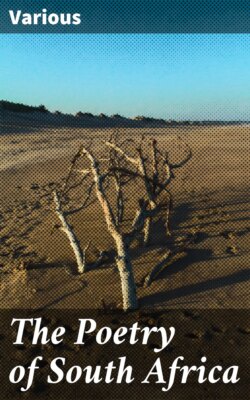Читать книгу The Poetry of South Africa - Various - Страница 8
На сайте Литреса книга снята с продажи.
EVENING RAMBLES.
ОглавлениеTable of Contents
The sultry summer-noon is past;
And mellow evening comes at last,
With a low and languid breeze
Fanning the mimosa trees,
That cluster o’er the yellow vale,
And oft perfume the panting gale
With fragrance faint; it seems to tell
Of primrose-tufts in Scottish dell,
Peeping forth in tender spring
When the blithe lark begins to sing.
But soon, amidst our Libyan vale,
Such soothing recollections fail;
Soon we raise the eye to range
O’er prospects wild, grotesque, and strange:
Sterile mountains, rough and steep,
That bound abrupt the valley deep,
Heaving to the clear blue sky
Their ribs of granite, bare and dry,
And ridges by the torrents worn,
Thinly streaked with scraggy thorn,
Which fringes nature’s savage dress,
Yet scarce relieves her nakedness.
But where the vale winds deep below
The landscape hath a warmer glow:
There the spekboom spreads its bowers
Of light green leaves and lilac flowers;
And the aloe rears her crimson crest,
Like stately queen for gala drest;
And the bright-blossomed bean-tree shakes
Its coral tufts above the brakes,
Brilliant as the glancing plumes
Of sugar birds among its blooms,
With the deep green verdure bending
In the stream of light descending.
And now along the grassy meads,
Where the skipping reebok feeds,
Let me through the mazes rove
Of the light acacia grove;
Now while yet the honey-bee
Hums around the blossomed tree;
And the turtles softly chide,
Wooingly, on every side;
And the clucking pheasant calls
To his mate at intervals;
And the duiker at my tread
Sudden lifts his startled head,
Then dives affrighted in the brake,
Like wild duck in the reedy lake.
My wonted seat receives me now—
This cliff with myrtle-tufted brow,
Towering high o’er grove and stream,
As if to greet the parting gleam.
With shattered rocks besprinkled o’er,
Behind ascends the mountain hoar,
Whose crest o’erhangs the Bushman’s cave
(His fortress once and now his grave),
Where the grim satyr-faced baboon
Sits gibbering on the rising moon,
Or chides with hoarse and angry cry
The herdsman as he wanders by.
Spread out below in sun and shade,
The shaggy Glen lies full displayed—
Its sheltered nooks, its sylvan bowers,
Its meadows flushed with purple flowers;
And through it like a dragon spread,
I trace the river’s tortuous bed.
Lo! there the Chaldee-willow weeps
Drooping o’er the headlong steeps,
Where the torrent in his wrath
Hath rifted him a rugged path,
Like fissure cleft by earthquake’s shock,
Through mead and jungle, mound and rock.
But the swoln water’s wasteful sway,
Like tyrant’s rage, hath passed away,
And left the ravage of its course
Memorial of its frantic force.
—Now o’er its shrunk and slimy bed
Rank weeds and withered wrack are spread,
With the faint rill just oozing through,
And vanishing again from view;
Save where the guana’s glassy pool
Holds to some cliff its mirror cool,
Girt by the palmite’s leafy screen,
Or graceful rock-ash, tall and green,
Whose slender sprays above the flood
Suspend the loxia’s callow brood
In cradle-nests, with porch below,
Secure from winged or creeping foe—
Weasel or hawk or writhing snake;
Light swinging, as the breezes wake,
Like the ripe fruit we love to see
Upon the rich pomegranate tree.
But lo! the sun’s descending car
Sinks o’er Mount Dunion’s peaks afar;
And now along the dusky vale
The homeward herds and flocks I hail,
Returning from their pastures dry
Amid the stony uplands high.
First, the brown Herder with his flock
Comes winding round my hermit-rock:
His mien and gait and gesture tell,
No shepherd he from Scottish fell;
For crook the guardian gun he bears,
For plaid the sheepskin mantle wears;
Sauntering languidly along;
Nor flute has he, nor merry song,
Nor book, nor tale, nor rustic lay,
To cheer him through his listless day.
His look is dull, his soul is dark;
He feels not hope’s electric spark;
But, born the white man’s servile thrall,
Knows that he cannot lower fall.
Next the stout Neat-herd passes by,
With bolder step and blither eye;
Humming low his tuneless song,
Or whistling to the hornèd throng.
From the destroying foeman fled—
He serves the Colonist for bread:
Yet this poor heathen Bechuan
Bears on his brow the port of man;
A naked homeless exile he—
But not debased by slavery.
Now, wizard-like, slow Twilight sails
With soundless wing adown the vales,
Waving with his shadowy rod
The owl and bat to come abroad,
With things that hate the garish sun,
To frolic now when day is done.
Now along the meadows damp
The enamoured firefly lights his lamp.
Link-boy he of woodland green
To light fair Avon’s Elfin Queen;
Here, I ween, more wont to shine
To light the thievish porcupine,
Plundering my melon-bed—
Or villain lynx, whose stealthy tread
Rouses not the wakeful hound
As he creeps the folds around.
But lo! the night-bird’s boding scream
Breaks abrupt my twilight dream;
And warns me it is time to haste
My homeward walk across the waste,
Lest my rash step provoke the wrath
Of adder coiled upon the path,
Or tempt the lion from the wood,
That soon will prowl athirst for blood,
—Thus, murmuring my thoughtful strain,
I seek our wattled cot again.
Thomas Pringle.
Glen Lynden, 1822.
